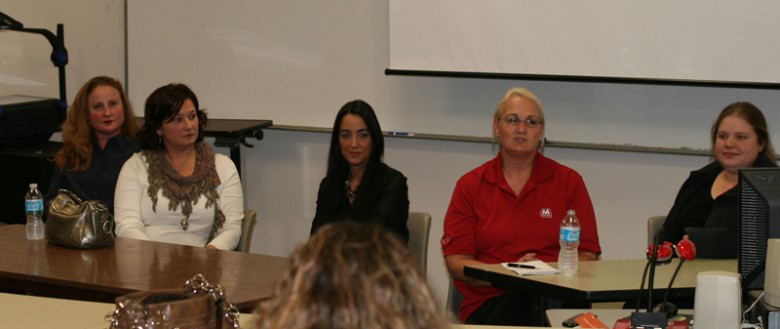"Stand proud" message of women in industry to students

College of the Mainland process technology students converge at this club meeting
in anticipation of special guests – five professionals with more than fifty years
of combined experience in the chemical, oil and gas industries.
Like the students assembled, all the guests are women.
During the panel discussion, Regina Cooper from Marathon Petroleum Corp., Lezlie Rivera
from Ashland Inc., Angela Magee from Dow Chemical Co., Erica Vasquez from Praxair
Technology Inc. and Roberta Larsen from Marathon Petroleum Corp. shared their experiences.
They discussed what motivated them to enter the field, their best and worst days on
the job and their advice on entering industries growing in both size and receptiveness
to women.
“If you want to work in a male-dominated field, you have got to make the effort and
you’ve got to let them see you make the effort. I have painted and cleaned out sewage
treatment plants. That gives you a lot of credibility,” said Magee, the sole woman
on the day shift at her first job.
“You are going to get dirty. You’ll learn a lot about yourself, things you didn’t
even know you were capable of. It is very rewarding.”
COM process technology student Monica Olguin organized the event so she and her classmates
could learn what textbooks cannot teach: how it feels to work a 12-hour day (or night)
as part of industry’s female minority.
“Most of the guys are great. Some feel like they need to help you. (If they do,) say,
‘I appreciate your showing me. Let me try,’” Magee advised.
Panelists’ reasons for choosing their competitive careers are as varied as the women
themselves.
“I wanted to be able to take care of myself. I didn’t want anyone taking care of me,"
said Rivera.
Many women shared experiences of family members trying to dissuade them from the field.
“My father was not too happy. He said, ‘You’re not going to have quality time with
family,’” Vasquez said, adding, “I really love it, and I don’t regret it.”
The women honestly addressed the challenges they faced in their careers.
“I’ve been on call 24/7, 365 days a year since graduation. I’ve been called at 3 a.m,”
said Larsen.
While demanding, jobs in Gulf Coast industries offer high pay, strong benefits and
job mobility.
“Almost all companies have a tuition reimbursement plan. You can get another degree
and give yourself more options,” said Cooper, who worked way up to her current position
as refinery training and development supervisor at Marathon Petroleum.
Larsen related her proudest moment at work when she realized how to clean a component
previously out of commission for three months. When functioning, it increased production
by 10,000 barrels of oil per day.
“You’ve got to celebrate your victories and your failures,” said Rivera.
Cooper encouraged students not to view themselves as the lone woman on the job.
“Go out there and exude confidence. Stand tall, stand proud, and own your mistakes,”
she said. “You have a support group here. Reach out to each other and reach out to
me. I’ll talk to you anytime, except 2 or 3 in the morning.”
Everyone laughed, remembering that in this business 2 or 3 a.m. calls happen. Thankfully,
so does this sisterhood.
